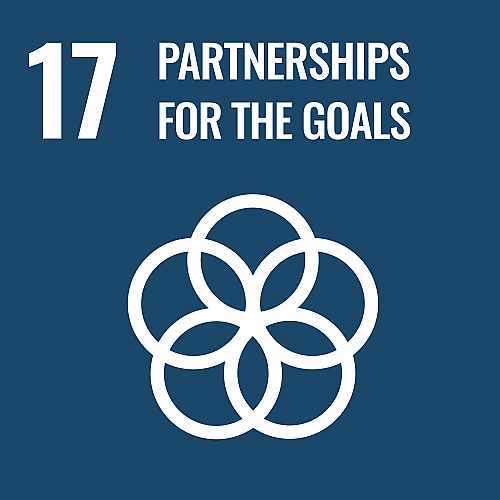Sustainability
MUBAS for Sustainable Development
Explore this section
SDG 17: Partnerships for the Goals


Partnerships for the Goals, aims to strengthen global cooperation to achieve all other SDGs. It focuses on mobilizing financial resources, sharing knowledge and technology, enhancing trade, and building multi-stakeholder partnerships to support sustainable development worldwide.
Indicators
17.2.1 Relationships with regional NGOs and government for SDG policy.
The university demonstrates direct involvement in SDG-relevant policy development through research and publication such as the work titled: “Risk Perception and Psychosocial Factors Influencing Exposure to Antimicrobial Resistance Through Environmental Pathways in Malawi”.
This publication evidences how the institution engages in identifying problems (antimicrobial resistance in the environment), analysing social/psychological drivers, and providing evidence that can inform national and regional policy strategy and monitoring.
University Input into SDG
17.2.2 Cross sectoral dialogue about SDGs.
MUBAS, through its School of Engineering, convened a major conference themed “Road to 2063 – Unlocking Development Through Engineering and Innovations.” The event brought together academics, industry practitioners, students, policy‑makers, and government and NGO representatives to engage in cross‑sectoral dialogue on engineering, innovation, sustainability, climate resilience and national development goals.
Dialogue Participation about SDgs
17.2.3 International collaboration data gathering for SDG.
The Malawi University of Business and Applied Sciences (MUBAS) actively engages in international collaborations to gather and measure data related to the Sustainable Development Goals (SDGs). Through partnerships with global organisations and peer institutions, the university contributes to designing methodologies, sharing data‑collection tools, and benchmarking progress against global SDG targets.
International Collaboration
17.2.4 Collaboration for SDG best practice.
The Malawi University of Business and Applied Sciences (MUBAS), through its School of Education, Communication and Media Studies, is organising an inaugural international conference under the theme of embracing teaching & learning innovation and sustainable practices. Participating institutions span multiple countries (Germany, Portugal, Uganda, Burkina Faso, Kenya, Ethiopia, South Africa, Tanzania), highlighting the university’s commitment to global collaboration
Collaboration on SGDs
17.2.5 Collaboration with NGOs for SDGs.
The WASHTED Sustainable Plastics Project demonstrates partnership with NGOs on research, student volunteering, and educational resource development to promote community sustainability.
Collaboration with NGOs on SDGs
17.3.1 Publication of SDG reports – per SDG.
The Malawi University of Business and Applied Sciences (MUBAS) publishes its progress on Sustainable Development Goals (SDGs 1 to 17) through a dedicated “Sustainability Reports & Downloads” section on its website. The page provides open access to transparently documented progress reports, demonstrating the university’s commitment to tracking, reporting and communicating its SDG-related activities and outcomes. Through this publication, MUBAS ensures accountability and enables stakeholders to review its performance across the full range of SDGs.
MUBAS SDG Report
17.4.1 Education for SDGs commitment to meaningful education.
Malawi University of Business and Applied Sciences (MUBAS) is committed to providing meaningful education on the Sustainable Development Goals (SDGs) that is relevant and applicable to all students. The university integrates SDG-focused content across its programmes, offering courses such as the Master of Science in Sanitation and the Master of Science in Sustainable Energy. These programmes equip students with knowledge and practical skills to address challenges in public health, sanitation, and clean energy, fostering awareness and action on key sustainability issues.
Commitment Education on SDGs
17.4.2 Education for SDGs: specific courses on sustainability.
Malawi University of Business and Applied Sciences (MUBAS) offers dedicated degree programmes that focus explicitly on sustainability and the Sustainable Development Goals (SDGs). Notably, the Master of Science in Sanitation equips students with the knowledge and skills to develop sustainable sanitation services while integrating public health and environmental considerations. Similarly, the Master of Science in Sustainable Energy provides students with expertise in energy access and energy management, addressing SDG 7 on affordable and clean energy. These programmes ensure that students from diverse academic backgrounds can engage deeply with sustainability issues, preparing them to contribute effectively to sustainable development initiatives locally and regionally.
Dedicated Courses adressing SDGs
17.4.3 Education for the SDGs in the wider community.
The Malawi University of Business and Applied Sciences (MUBAS) carried out a community‑outreach initiative engaging secondary‑school pupils across Malawi, a project supported by the Skills for a Vibrant Economy (SAVE) Project. Through sensitization workshops conducted in over 26 schools and reaching more than 8,000 students, the university equipped young learners with knowledge about gender‑based violence (GBV), its various forms and how to respond.
Educational outreach
17.4.4 Sustainability literacy.
The university demonstrates a structured approach to assessing sustainability literacy by administering a formal survey among its student body. A downloadable survey document available on the university’s website shows that students are asked to respond to questions designed to evaluate their knowledge, attitudes and behaviours related to sustainability and the Sustainable Development Goals (SDGs). Through this instrument, the institution is able to capture meaningful data on how well students understand sustainability concepts and how prepared they are to apply them in practice.
Sustainability Literacy
